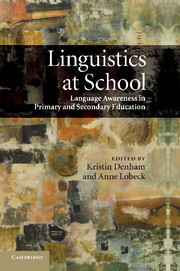Book contents
- Frontmatter
- Contents
- Notes on contributors
- Foreword: The challenge for education
- Introduction
- Part I Linguistics from the top down: encouraging institutional change
- Introduction to Part I
- 1 Ideologies of language, art, and science
- 2 Bringing linguistics into the school curriculum: not one less
- 3 How linguistics has influenced schools in England
- 4 Supporting the teaching of knowledge about language in Scottish schools
- 5 Envisioning linguistics in secondary education: an Australian exemplar
- 6 Linguistics and educational standards: the California experience
- 7 Developing sociolinguistic curricula that help teachers meet standards
- 8 Linguistic development in children's writing: changing classroom pedagogies
- Part II Linguistics from the bottom up: encouraging classroom change
- Part III Vignettes: voices from the classroom
- References
- Index
7 - Developing sociolinguistic curricula that help teachers meet standards
Published online by Cambridge University Press: 04 August 2010
- Frontmatter
- Contents
- Notes on contributors
- Foreword: The challenge for education
- Introduction
- Part I Linguistics from the top down: encouraging institutional change
- Introduction to Part I
- 1 Ideologies of language, art, and science
- 2 Bringing linguistics into the school curriculum: not one less
- 3 How linguistics has influenced schools in England
- 4 Supporting the teaching of knowledge about language in Scottish schools
- 5 Envisioning linguistics in secondary education: an Australian exemplar
- 6 Linguistics and educational standards: the California experience
- 7 Developing sociolinguistic curricula that help teachers meet standards
- 8 Linguistic development in children's writing: changing classroom pedagogies
- Part II Linguistics from the bottom up: encouraging classroom change
- Part III Vignettes: voices from the classroom
- References
- Index
Summary
Introduction
Over the past half-century, advances in analyzing and understanding language – as it exists cognitively and as it is used socially – have shed light on the role language plays in perpetuating inequalities among stigmatized groups. Despite the importance of such information, sociolinguistic knowledge has not yet permeated mainstream American education even though there have been some who appealed for it roughly fifty years before modern sociolinguistic study emerged. The first president of the National Council of Teachers of English (NCTE), Fred Newton Scott, encouraged the inclusion of information about language diversity to be included as part of English studies (Carpenter, Baker, and Scott 1908). While it may be tempting to conclude that linguists have not been proactive enough in making the general public aware of the importance of their findings, the continued embrace of traditional grammar instruction is probably more attributable to revered notions of traditional grammar instruction as opposed to a failing of any specific groups, be they linguists or English teachers.
Linguists should not be overly dismayed at the apparent lack of progress in convincing teachers to incorporate sociolinguistic information in public schools. Though unquestionably from a different era, it is worth considering one such corollary of how slowly traditional views change. In 1514, Copernicus published observations that postured, contrary to conventional wisdom and theological doctrine, that the Earth revolved around the Sun and not vice versa. Galileo confirmed this in 1610, which led to his eventual imprisonment in 1633.
- Type
- Chapter
- Information
- Linguistics at SchoolLanguage Awareness in Primary and Secondary Education, pp. 91 - 105Publisher: Cambridge University PressPrint publication year: 2010
- 2
- Cited by



